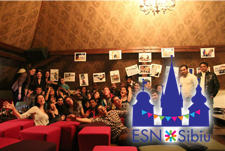Erasmus Placement Offers
This allows students from higher education institutions to benefit from a work placement of between 3 and 12 months, in a company or organization from another participating country.
"Placement" is another name for the well known training or internship. The organization hosting the placement can be an enterprise, a training centre or another organization, including an institution of higher education. The Erasmus students are selected by the higher education institutions through a clear and transparent process.
Prior to their departure, the Erasmus students sign a placement contract, which includes the following documents:
"¢ "training contract" setting out the placement programme; this contract must be approved and signed by the home institution, by the host institution and by the student;
"¢ "commitment for quality during mobility" which specifically states the rights and obligations of all participating parts in the placement programme;
"¢ The "Erasmus student charter" setting out the rights and obligations of the student during the mobility.
At the end of the placement period, the sending institution must fully recognize the period spent abroad as agreed in the training contract, preferably by using the ECTS credit system. In the special case of a placement period which is not included in the student's curriculum, the sending institution must recognize this placement at least in the Diploma Supplement.
Students can be awarded a grant to help them cover their transport and subsidence expenses (including the insurance and visa costs) connected to the period of placement abroad.
The payment of national scholarships or loans to outgoing students will be maintained throughout the placement period abroad. Before the placement period, the Erasmus student may attend, if offered, an intensive language course in the host language, for which he can also be granted funding. Students with special needs can apply for a specific grant after having been selected for a mobility period.
The Erasmus student status stipulates that all the student's obligations (payment of the tuition fee in the home university, the passing of exams or their recognition, etc), as well as his/her rights (merit/social scholarship, place in the dormitory) are maintained during the mobility period.
The following types of organizations are not eligible as host organizations:
EU institutions and other EU organizations including agencies (their complete list can be consulted at ec.europa.eu/institutions/index_en.htm);
"¢ organizations managing EU programmes (in order to avoid conflicts of interests or double financing);
"¢ national diplomatic bodies (embassies, consulates, cultural institutes, schools, as a result of transnational requirements)


